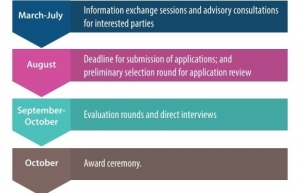Influence of AI technology can reshape labour market
 |
| Influence of AI technology can reshape labour market, illustration photo/ Source: freepik.com |
Two weeks ago, Hanoi Parking Co., Ltd. proposed an AI pilot managing and operating 6-8 car parks in Hanoi. This initiative includes both enclosed parking facilities and on-street parking spots managed by the company for a period of six months.
The company proposes to utilise radio-frequency identification (RFID) and AI technologies. RFID technology is currently being used in electronic toll collection at toll plazas on highways, while AI technology will help accurately recognise licence plates, supporting vehicle control at entry and exit points of parking facilities.
The company estimates that the equipment cost for an enclosed car park is approximately $14,500, while such a cost for an on-street parking spot is slightly over $600.
According to the data from the Department of Transportation of Hanoi, the city currently has 57 enclosed parking lots and 639 on-street parking spots. If each car park currently requires a minimum of two workers, it is anticipated that the implementation of the new technologies could potentially lead to a 50 per cent reduction in the number of labourers needed.
According to research by American technological research and consulting firm Gartner, businesses that implement AI will achieve higher revenue and reduce operational costs by about 20 per cent.
In Singapore, the use of AI virtual assistants has helped the Sephora retail chain increase their average monthly revenue by $30,000. In Vietnam, retail businesses have also quickly adopted AI in their operations through automated chatbot solutions to enhance the consumer shopping experience.
However, alongside the positive aspects, AI technology is also predicted to have an impact on the jobs of many workers, even those with training, facing equivalent risks.
According to The Future of Jobs Report 2023 by the World Economic Forum, the labour market structure is projected to lose almost a quarter of jobs in the next five years. Employers forecast that 69 million new jobs will be created, but 83 million jobs will disappear.
The report revealed that the most heavily impacted and susceptible job positions to be replaced by AI are in IT, finance, business, operations, human resources, and marketing. The report was based on the analysis of nearly 900 job positions as of September last year.
According to Gartner’s prediction for 2026, approximately half of coding and programming jobs will be performed by AI.
Despite lingering concerns, according to some experts, the future of the labour market with the involvement of AI technology is not as bad as many people think.
“AI eliminates jobs and creates new opportunities and changes the way of working,” said Nguyen Thu Giang, deputy director of Navigos Search North. “There are several indications that this tool is indeed creating new opportunities and driving growth across various industries.”
Giang explained that in certain industries with repetitive and rule-based tasks, AI or automation has been widely adopted to reduce the need for labour. However, AI is not yet capable of threatening personnel responsible for complex tasks that require sharpness, flexibility, problem-solving abilities, and social interaction.
According to Microsoft’s 2023 Work Trend Index, many business leaders in Vietnam believe that AI will bring more value to the workplace rather than replacing employees, contributing to a 35 per cent increase in productivity.
Out of every 10 Vietnamese workers, nine feel comfortable using AI not only for administrative tasks but also for analytical work and even creative aspects.
Truong Hoang Tho, founder and CEO of Alipo Creative, with 13 years of experience in the digital creative industry, believes that the demand for AI applications in advertising and media businesses has been increasing since the beginning of this year.
“AI will positively support advertising businesses in analysing customer requirements, researching, and developing ideas, analysing data, and thereby providing personalised solutions for customers,” Tho said. “In addition, AI also helps advertising and media businesses optimise costs, increase work efficiency, and gain a competitive edge. However, the application of AI is still in the early stages of exploration and experimentation. In the first quarter, I have not seen many brands implementing AI in their advertising campaigns.”
According to the Ministry of Information and Communications, Vietnam is only meeting one-tenth of the demand for AI talent in the market. Meanwhile, Navigos said 59 per cent of businesses stated that they will recruit additional personnel in 2024, accounting for less than one-quarter of their workforce, with a focus on positions related to AI, digital technology, and data processing.
Facing the challenges in workforce demand, Tho said that personnel in certain businesses are proactively seeking out courses to enhance their skills and gain a competitive advantage. Meanwhile, others will be sent by their companies to receive training to meet the job requirements.
“Due to the rapid development of AI, there are still limited high-quality training institutions in the market, which poses a challenge for learners when choosing a training facility to enhance their skills,” Tho added.
 | Generative AI revolution powered by Asia-Pacific startups Startups have consistently been at the cutting edge of innovation, and in the age of generative AI, they are poised to harness this technology to transform customer experiences and the way we work. |
 | Microsoft hires DeepMind co-founder to lead AI unit DeepMind co-founder Mustafa Suleyman will become the head of a newly created consumer AI unit at Microsoft, the scientist and entrepreneur said on Tuesday. |
 | Vietnam eyes comprehensive ecosystem for AI technology Tech companies are facing huge opportunities to develop AI and semiconductors with the support of the government and authorities. |
What the stars mean:
★ Poor ★ ★ Promising ★★★ Good ★★★★ Very good ★★★★★ Exceptional
Related Contents
Latest News
More News
- Masan Consumer names new deputy CEO to drive foods and beverages growth (February 23, 2026 | 20:52)
- Myriad risks ahead, but ones Vietnam can confront (February 20, 2026 | 15:02)
- Vietnam making the leap into AI and semiconductors (February 20, 2026 | 09:37)
- Funding must be activated for semiconductor success (February 20, 2026 | 09:20)
- Resilience as new benchmark for smarter infrastructure (February 19, 2026 | 20:35)
- A golden time to shine within ASEAN (February 19, 2026 | 20:22)
- Vietnam’s pivotal year for advancing sustainability (February 19, 2026 | 08:44)
- Strengthening the core role of industry and trade (February 19, 2026 | 08:35)
- Future orientations for healthcare improvements (February 19, 2026 | 08:29)
- Infrastructure orientations suitable for a new chapter (February 19, 2026 | 08:15)

 Tag:
Tag:


















 Mobile Version
Mobile Version